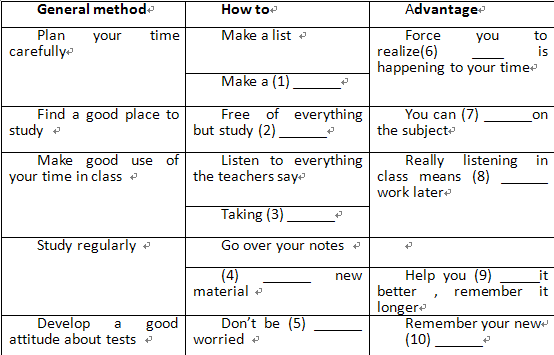
 阅读快车系列答案
阅读快车系列答案科目:高中英语 来源:2012年普通高等学校招生全国统一考试重庆卷英语 题型:050
| |||||||||||||||||||||||||||||||||||||||||||||||||||||||||||
查看答案和解析>>
科目:高中英语 来源:安徽省期中题 题型:阅读理解
任务型读写。请认真阅读下面短文,并根据所读内容在文章后图表中的空格里填
入最恰当的单词。)注意:每空不超过1个单词。
Maybe you are an average student. You probably think you will never be a top student.
This is not necessary so, however. Anyone can become a better student if he or she wants to.
Here's how:
1. Plan your time carefully. When you plan your week, you should make a list of things
that you have to do. After making this list, you should make a schedule of your time. First your
time for eating, sleeping, dressing, etc. then decide a good, regular time for studying. Don't forget
to set aside enough time for entertainment. A weekly schedule may not solve all your problems,
but it will force you to realize wha is happening to your time.
2. Find a good place to study. Look around the house for a good study area. Keep this
space, which may be a desk or simply a corner of your room, free of everything but study materials.
No games, radios, or television! When you sit down to study, concentrate on the subject.
3. Make good use of your time in class. Take advantage of class time to listen to everything
the teachers say. Really listening in class means less work later. Taking notes will help you remember
what the teacher says.
4. Study regularly. When you get home from school, go over your notes. Review the important
points that your teacher mentioned in class. If you know what your teacher is going to discuss the
next day, reading that material will become more meaningful, and you will remember it longer.
5. Develop a good attitude about tests. The purpose of a test is to show what you have
learned about a subject. They help you remember your new knowledge. The world won't end if
you don't pass a test, so don't be overly worried.
There are other methods that might help you with your studying. You will probably discover
many others after you have tried these.
How to become a better student
查看答案和解析>>
湖北省互联网违法和不良信息举报平台 | 网上有害信息举报专区 | 电信诈骗举报专区 | 涉历史虚无主义有害信息举报专区 | 涉企侵权举报专区
违法和不良信息举报电话:027-86699610 举报邮箱:58377363@163.com